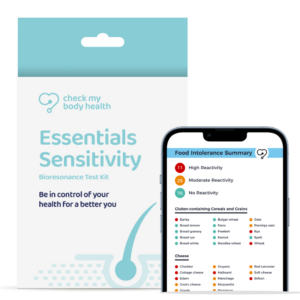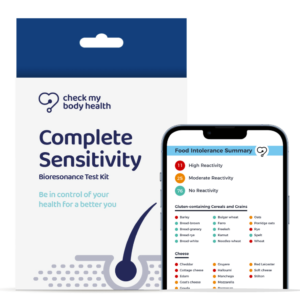
Medically reviewed by GP Gareth James MBBS, DFFP, DRCOG, MRCGP on December 3, 2023. To give you technically accurate, evidence-based information, content published on the Check My Body Health blog is reviewed by credentialed professionals with expertise in medical and bioscience fields.
The Fatigue Epidemic
Feeling constantly tired and lacking energy is a widespread problem with far-reaching consequences. Chronic fatigue can drag down your productivity, dampen your mood, and negatively affect your overall quality of life. While getting enough sleep is foundational for good health, it’s not the sole answer to feeling energised and vibrant.
Importance of Sustainable Energy
Think of energy like a bank account. Sleep is a significant deposit, but there are additional strategies to increase your balance and avoid running on empty. This guide explores ways to boost your energy levels for a more fulfilling and active life.
Ways to Boost Energy
1. Drink More Water
Dehydration, even mild, is a surprisingly common cause of fatigue. Our bodies depend on water for numerous functions, including energy production. Aim to drink plenty of water throughout the day. Listen to your thirst cues and opt for water over sugary or caffeinated beverages whenever possible.
- Set reminders: Download a water-tracking app or use alarms throughout the day.
- Flavour it up: Add slices of citrus, cucumber, or berries to your water for a refreshing boost.
- Carry a reusable bottle: Have water within reach to encourage drinking throughout the day.
2. Cut Down on Caffeine
While caffeine can provide a temporary energy boost, relying on it heavily can become counterproductive. Over time, excessive caffeine can disrupt sleep patterns and lead to a cycle of fatigue and reliance on stimulants. If you’re a heavy caffeine user, try gradually reducing your intake to see if you notice improvements in your energy levels.
- Switch to decaf: Gradually replace some caffeinated beverages with decaf options.
- Explore herbal teas: Enjoy warm and comforting teas that naturally boost energy without the caffeine crash.
- Track your intake: Journal how much caffeine you consume daily to identify patterns.
3. Eat Healthier
The food you eat has a direct impact on how you feel. A diet rich in whole, unprocessed foods provides your body with the nutrients it needs to thrive. Focus on fruits, vegetables, lean proteins, and healthy fats. Limit processed foods, sugary snacks, and excessive refined carbohydrates, which can lead to energy crashes.
- Meal prep: Plan your meals and snacks in advance to avoid unhealthy options.
- Read food labels: Be mindful of hidden sugars and processed ingredients.
- Make small changes: Start by adding one more serving of fruits or vegetables to your daily intake.
4. Cut Out Problem Foods
Beyond eating a generally healthy diet, it’s important to be aware of your body’s unique sensitivities. Food intolerances can contribute to fatigue, bloating, and other discomforts that drain your energy. If you suspect certain foods are affecting you, consider an elimination diet or a food sensitivity test like one of Check My Body Health’s food intolerance tests to pinpoint potential triggers.
- Start a food diary: Track your meals, snacks, and any symptoms you experience to identify potential triggers.
- Try an elimination diet: Remove suspected problem foods for a few weeks, then reintroduce them one at a time, noting reactions.
- Consider a food sensitivity test: Tests like Check My Body Health’s food intolerance test offer insights into specific food sensitivities for targeted elimination.
5. Drink Less Alcohol
Alcohol, while initially a depressant, can disrupt your sleep quality and leave you feeling groggy and fatigued the following day. Reducing or eliminating alcohol can significantly improve your sleep and energy levels.
- Set limits: Choose specific days to abstain from alcohol, or limit yourself to one or two drinks on other days.
- Try mocktails: Explore fun and flavorful non-alcoholic alternatives.
- Track your progress: Notice how reduced alcohol intake influences your sleep and energy levels.
6. Exercise Each Day
Regular physical activity might seem counterintuitive when you’re feeling tired, but it’s a powerful energy booster. Exercise improves cardiovascular health, increases oxygen flow, and releases endorphins (mood-boosting chemicals). Find activities you enjoy and start gradually, even if it’s just a 10-minute walk. Consistency is key!
- Find enjoyable activities: Choose workouts you find fun, whether it’s dancing, nature walks, or swimming.
- Start small: Aim for short 10-15 minute intervals of exercise and gradually increase duration.
- Be consistent: Aim for 3-5 days of exercise per week, even if the exercise is light.
7. Get Enough Sunlight
Sunlight plays a crucial role in regulating our sleep-wake cycle and mood. Exposure to sunlight, especially in the morning, can help improve energy levels and boost alertness. Aim for at least 15-20 minutes of sunlight each day.
- Morning walks: Combine sunlight with exercise for a double dose of energy boosting.
- Take breaks outside: Step out during lunch or work breaks to soak up some rays.
- Open the curtains: Let natural sunlight flood your living and work spaces.
8. Optimise Your Sleep Environment
The quality of your sleep dramatically impacts your daytime energy. Create a sleep sanctuary that is dark, cool, and quiet. Invest in blackout curtains, a comfortable mattress, and minimise distractions for the most restful night.
- Invest in blackout curtains: Choose curtains designed to block out all light for deeper sleep.
- Temperature control: Keep your bedroom cool (around 65°F or 18°C) for optimal sleep.
- White noise playlist: Block out distracting sounds and create a peaceful sleep environment.
9. Address Underlying Health Issues
If you find chronic fatigue persists despite implementing these strategies, it’s important to consult with your doctor. Prolonged tiredness can sometimes be a symptom of underlying medical conditions that require professional treatment.
- Schedule a doctor’s appointment: Discuss your fatigue concerns and possible causes.
- Rule out medical conditions: Blood tests may be recommended to check for anaemia, thyroid issues, etc.
- Open communication: Don’t hesitate to seek professional help for persistent fatigue.
10. Practice Stress Relief
Chronic stress depletes energy reserves and takes a toll on both mental and physical health. Incorporating regular stress-relief techniques into your routine is essential for maintaining energy and focus.
- 5-minute deep breathing: Try guided breathing apps or simple techniques like box breathing (inhale 4, hold 4, exhale 4, hold 4).
- Mindfulness apps: Explore apps like Headspace or Calm for guided meditations.
- Find what works for you: Experiment with yoga, music, nature walks, or any activities that bring a sense of calm.
Reclaim Your Energy, Revitalise Your Life
Constant fatigue doesn’t have to be your norm. While sleep is essential, it’s only one piece of the energy puzzle. By embracing the strategies in this guide, you gain a toolkit to build a foundation for sustainable, long-lasting energy.
Start by taking ownership of your energy levels. Choose one or two changes that resonate with you and see how they make you feel. Even small victories deserve celebration! As you experience the benefits, gradually incorporate more of these tips. This way, you’re creating a personalised plan that aligns with your individual needs.
Imagine a life where fatigue is no longer holding you back. With increased energy, you can tackle your goals, engage wholeheartedly in activities you enjoy, and make the most of every day. This journey starts now – embrace a more vibrant and empowered you!




